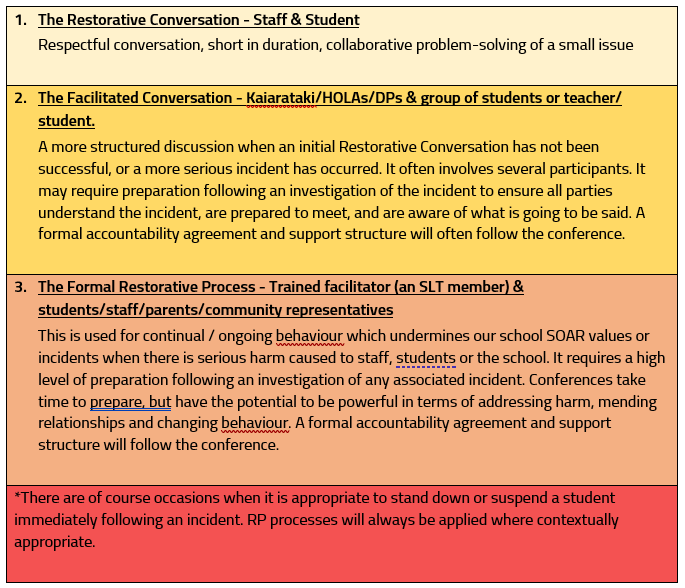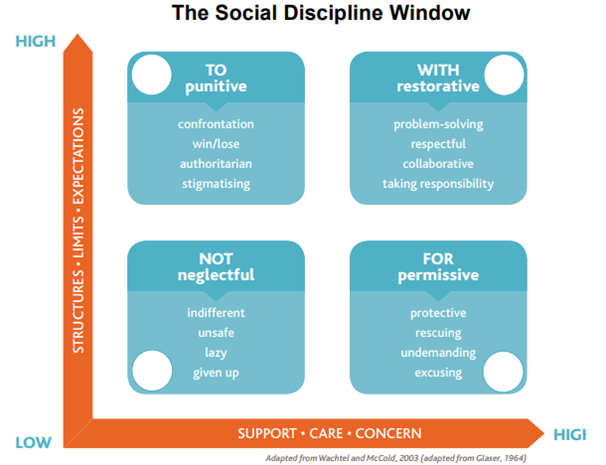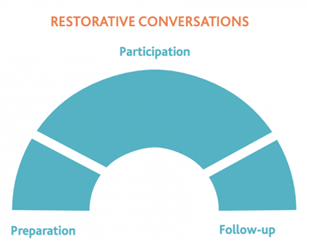Restorative Practice (RP) and Restorative Justice
AT NAYLAND COLLEGE
As a Relationships Based Learning school, Nayland College aims to draw upon the latest research in best practice around building a strong learning culture in all contexts and keeping our school SOAR values at the forefront at all times.
The College recognizes that the key to an amicable environment is being able to identify when and how relationships are negatively impacted, and to adopt a community-wide approach to problem-solving.
At Nayland College we endeavour to work in a restorative way; where we work WITH students, rather than “do to” or “do for” them.
What is Restorative Practice (RP)?
Restorative Practice is a relational approach to managing school life grounded in beliefs about equality, dignity, mana and the potential of all people.
Restorative Practice has four underlying principles:
- Positive interpersonal relationships are a major influence on behaviour
- A culture of care supports the mana of all individuals in the school community
- Cultural responsiveness is key to creating learning communities of mutual respect and inclusion.
- A restorative approach leads to individuals taking responsibility for their behaviour.
Restorative practice is a philosophy that recognizes good relationships as the cornerstone of creating an effective learning environment.
The essence of Restorative Practice is accepting that people, especially teenagers, will make mistakes, and when these occur, young people need to be supported to own their behaviour, 'put things right’, and understand and learn from the process.
Restorative Practice is not about removing consequences, but ensuring that the process involving any appropriate outcomes for behaviour, is fit for purpose and part of a learning process.
A Restorative Approach:
- Allows for understanding of the effect of the behaviour and a chance to repair the harm caused.
- Requires students to be accountable for their actions.
- Encourages respect for all concerned.
- Is a way for students to develop better understanding of, and empathy with, others.
- Acknowledges that making mistakes is a natural part of maturing.
- Understands that positive relationships are crucial to having the best educational outcomes for students.
- Is a process in which students learn to manage disagreement and conflict in a calm manner.
- Allows focus on the ‘need’ rather than the ‘deed.’

So how does discipline work at Nayland College?
Restorative Practice is not a “soft approach” to discipline. Stand-down and suspension may still be part of the process for a student who has committed serious wrong-doing. However, unlike traditional approaches to discipline, it is not the only consequence. The aim is that students repair any harm to others they have caused, not just have a “2 day break from school”. It is the accountability, and reparation aspects of the Restorative process that tends to have the most impact upon those whose behaviour has impacted others, with research demonstrating repeat behaviours following an RP process compared with a purely punitive one, are significantly lower.
An RP approach to discipline can often involve teachers, and other students, working together to problem-solve when behaviours occur that do not align with our SOAR values.
Nayland College is a school that aspires to ensure that both those whose behaviour has impacted others, and those who have been affected, and their respective associated communities, are active participants in processes that ensure equitable justice and fairness.
This may often, but not always, involve a group conference where representatives of all parties are able to have their voices heard.
- We undertake for victims to have their needs met and to have their experience validated.
- Wrongdoers are able to tell their stories and given the chance to make amends.
- And finally, the school and associated communities of care, can seek ways to safeguard against the incident happening again.
The Core Elements of using a Restorative Approach:
- Aim for all processes to align with our school values (SOAR) and our Relationship Based Learning approach
- We work with those involved to problem-solve. We undertake to not do the process “to” or “for” them.
- The process always covers the following steps for those whose behaviour has impacted others, and those who have been impacted by someone’s behaviour:
- What happened (tell the story)
- Who has been affected
- What needs to happen to put things right
- How do we make sure this doesn’t happen again
- RP is a structured approach that always involves the following 3 parts in the archway
Conference Types


Join the Nayland College Family
We welcome all enquiries and are very happy to assist you in making this important decision for your future.

